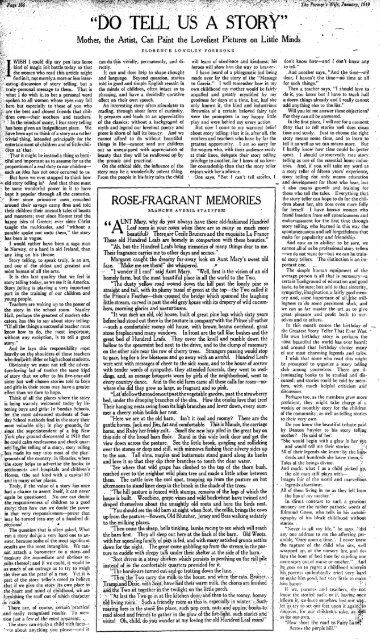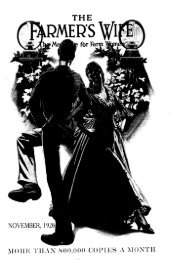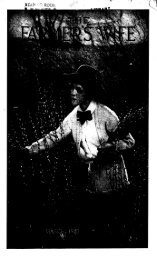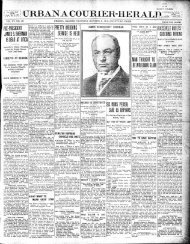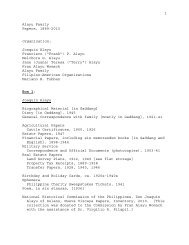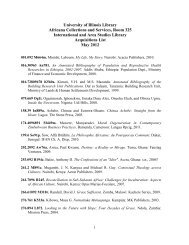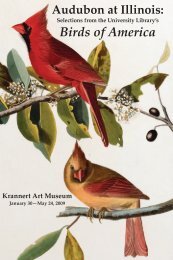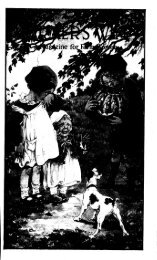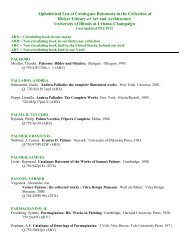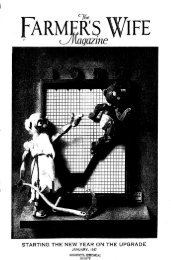A WOMAN'S FARM JOURNAL - University of Illinois
A WOMAN'S FARM JOURNAL - University of Illinois
A WOMAN'S FARM JOURNAL - University of Illinois
You also want an ePaper? Increase the reach of your titles
YUMPU automatically turns print PDFs into web optimized ePapers that Google loves.
T. WISH I could dip my pen into some<br />
/.j. 'kind <strong>of</strong> magic ink bottle today so that<br />
: V||-- the women who read this article might<br />
> ¦• ¦ find in it, not merelya more or less interesting<br />
discussion <strong>of</strong> story telling, but a<br />
truly-personal message to them. That is<br />
what I do wish it.to be: a personal word<br />
spoken to all women whose eyes may fall<br />
here but especially to those <strong>of</strong> you who<br />
are the best and closest friends that children<br />
own—their mothers and teachers.<br />
.<br />
In the minds <strong>of</strong> many, I fear story telling<br />
has been given an insignificant place. We<br />
Save been apt to think <strong>of</strong> a story as a rather<br />
trivial thing, intended principally for the<br />
entertainment <strong>of</strong> children and <strong>of</strong> little children<br />
at' that.<br />
'. That it might be instead a thing so beautiful<br />
and important as to assume for us the<br />
proportions <strong>of</strong> a real duty to our children—<br />
such an idea has not once occurred to us.<br />
But- have we ever stopped to think how<br />
old story telling is? And that there must<br />
be some wonderful power in it to have<br />
kept it popular through all the centuries.<br />
. Ever since primitive men ., crouched<br />
around their savage camp fires and. told<br />
their children their uncouth tales <strong>of</strong> beasts<br />
and monsters; ever since Homer trod the<br />
happy isles <strong>of</strong> Greece; ever since Christ<br />
taught the multitudes, and "without a<br />
parable spake not unto them," the story<br />
has been in vogue.<br />
I would rather have been a saga man<br />
in Norway, or a bard in old Ireland, than<br />
any king on his throne.<br />
Story telling, to speak truly, is an art,<br />
and one <strong>of</strong> the oldest and greatest and<br />
most human <strong>of</strong> all the arts.<br />
It is this last quality that we feel in<br />
story telling today, as we see it in America.<br />
Story ,telling is playing a very important<br />
part in the training <strong>of</strong> our children and<br />
young people.<br />
Teachers are waking up to the power <strong>of</strong><br />
the story in the school room. Stanley<br />
Hall, perhaps the greatest <strong>of</strong> modern educators,<br />
has this to say about story telling:<br />
"Of all the things a successful teacher must<br />
know how to do, the most important,<br />
without any exception, is to tell a good<br />
story."<br />
And: he lays this responsibility most<br />
heavily on the shoulders <strong>of</strong> those teachers<br />
who dealjwith older or high school students.<br />
Obviously we must not tell the adventure-loving<br />
lad <strong>of</strong> twelve the same kind<br />
<strong>of</strong> story that we <strong>of</strong>fer to his five-year-old<br />
sister but well chosen stories told to boys<br />
and girls in their teens may have a greater<br />
effect than we dare to hope.<br />
' Think <strong>of</strong> all the places where the story<br />
is being warmly welcomed today by listening<br />
boys and girls: In Sunday Schools,<br />
for the most advanced students <strong>of</strong> Sunday<br />
School methods find in the story their<br />
most valuable ally; in play grounds, for<br />
since, the; superintendent <strong>of</strong> a big New<br />
york play ground discovered in 1910 that<br />
he could calm restlessness and check quarrels<br />
hy_the telling <strong>of</strong> a story, story telling<br />
has, made its way into most <strong>of</strong> the playgrounds<br />
<strong>of</strong> the country; in libraries, where<br />
the stony hel ps to advertise the books; in<br />
settlements and . hospitals and children's<br />
Homes, (the sad kind with a capital H)<br />
and in many other places.<br />
. Truly, if the value <strong>of</strong> a story has once<br />
had a chance to assert itself, it can never<br />
again be questioned. No one can doubt<br />
tHe;responsiveness <strong>of</strong> children to a good<br />
story; then how can we doubt the power<br />
in that very responsiveness—power that<br />
may be-turned into any <strong>of</strong> a hundred directions?<br />
* ¦<br />
. The question that is <strong>of</strong>ten asked, What<br />
tah a story do?us a very hard one to answer,<br />
because some <strong>of</strong> the most significant<br />
•results are the most intangible. We cannot<br />
attach a barometer to a story- and<br />
measure the. immediate and obvious results<br />
there<strong>of</strong>; and if we could , it would be<br />
•as much <strong>of</strong> an outrage as to try to weigh<br />
•th'e 'dewon the petal <strong>of</strong> a rose. Yet . it is<br />
part <strong>of</strong> the story teller's creed to believe<br />
:that, if we give the sto'ry. its own place in<br />
.the heart'and mind <strong>of</strong> childhood , we are<br />
furnishing the stuff out <strong>of</strong> which character<br />
,is ma'de. , ' • • . • ¦- -.. - •<br />
¦ There.are, <strong>of</strong> course, certain 'practical<br />
: and easily recognized results. To mention<br />
just a few <strong>of</strong> the most apparent: >v<br />
The story can equip a child with facts—<br />
'-'•ts about anything you please—and it<br />
"DO TELL USA STORY" -<br />
Mother, the Artist, Can Paint the Loveliest Pictures on Little Minds<br />
can do this vividly, permanently, and directly.<br />
¦<br />
It can and does help to shape .thought<br />
and language. Beyond question, stories<br />
told in good and simple English remain in<br />
the rriinds <strong>of</strong> children, <strong>of</strong>ten intact as to<br />
phrasing, and have a decidedly curative<br />
effect on their own speech.<br />
An interesting story <strong>of</strong>ten stimulates to<br />
reading, through sheer force <strong>of</strong> curiosity.<br />
It prepares and leads to an appreciation<br />
<strong>of</strong> the classics; without a background <strong>of</strong><br />
myth and legend our loveliest poetry and<br />
prose is shorn <strong>of</strong> half its beauty. And we<br />
cannot afford' to do without beautiful<br />
things in life—cannot send our children<br />
out so unequi pped with appreciation <strong>of</strong><br />
beauty that they will be swallowed up" by<br />
the prosaic and practical.<br />
On the ethical side, the influence <strong>of</strong> the<br />
story may be a wonderfully potent thing.<br />
From the people in his fairy tales the child<br />
FLORENCE 10NGLEY FOSBROKE<br />
will learn <strong>of</strong> obedience and kindness; his<br />
heroes will show him the way to bravery.<br />
I have heard <strong>of</strong> a phlegmatic lad being<br />
made over by the story <strong>of</strong> the "Message<br />
to Garcia." I well remember how in my<br />
own childhood my mother would be fairly<br />
appalled and greatly mystified by my<br />
goodness for days at a time, but, had she<br />
only known it, the kind and industrious<br />
Brownies <strong>of</strong> a certain beloved fairy tale<br />
were the prompters in my happy little<br />
play and were behind my every action.<br />
But now I come to my warmest belief<br />
about story telling: that it is, after all, the<br />
mothers and teachers who have by far the<br />
greatest opportunity. 1 am so sorry for<br />
the women who, with their audience ready<br />
at their knee, delegate their story telling<br />
privilege to another, for I know <strong>of</strong> no lovelier-comradeship<br />
than that the story teller<br />
enjoys with her audience.<br />
One says, "But I can't tell stories, I<br />
ROSE-FRAGRANT MEMORIES<br />
BLANCHE AVERIL STAI7FFER5<br />
I ( A UNT Mary, why do you always have those old-fashioned Hundred<br />
ZA Leaf roses in your room when there are so many so much more<br />
beautiful? There.are Cecile Bruhers and the exquisite La France<br />
Those old Hundred Leafs are homely in comparison with these beauties."<br />
"Ah, but the Hundred Leafs bring memories <strong>of</strong> many things dear to me.<br />
Their fragrance carries me to other days and scenes."<br />
Margaret caught the dreamy far-away look on Aunt Mary's sweet old<br />
face. "Make me see them!" she whispered. ¦<br />
- "I wonder if I can!" said Aunt Mary. "Well, first is the vision <strong>of</strong> an old<br />
homely farm, but the most beautiful place in all the world to the Two.<br />
"The dusty yellow road wound down the hill past the lonely pine so<br />
straight and tall, with its plumy tassel <strong>of</strong> green at the top—the Two called it<br />
the Prince's Feather—then-crossed.the bridge which spanned the laughing<br />
little stream, curved in past the-old grjey house with its drapery <strong>of</strong> wild cucumbers,<br />
morning glories and nasturtiums.<br />
"It was such an old, old house, built <strong>of</strong> great pine logs which sixty years<br />
before had stood out there in the pasture in companjrwith the Prince's Feather<br />
—such a comfortable roomy old house, with brown, beams overhead, great<br />
stone fireplace'and many windows. In front are the tall lilac bushes and the<br />
great bed <strong>of</strong> Hundred Leafs. They cover the knoll and ramble down the<br />
hollow to the spearmint bed next to the drive, and to the clump <strong>of</strong> rosemary<br />
on the other side near the row <strong>of</strong> cherry trees. Strangers passing would stop<br />
to gaze, beg for a few blossoms and go away with an armful. Hundred Leafs<br />
were sent with messages <strong>of</strong> cheer to the sick room, and to the house <strong>of</strong> sorrow<br />
with tender words <strong>of</strong> sympathy, they attended funerals, they went to weddings,<br />
and, as corsage bouquets worn by girls <strong>of</strong> the neighborhood, went to<br />
every country dance. And to the old farm came all these calls for roses—nowhere<br />
else did they grow so large, so fragrant and so pink.<br />
"Let'sfollowtheroadonoutpastthe vegetable garden, past the strawberry<br />
bed, under the drooping branches <strong>of</strong> the elm. How the orioles love that tree!<br />
Their hanging nests swing from its high branches and lower down, every summer<br />
a cheery robin builds her nest.<br />
"Here we are at the old barn. Isn't it cool and roomy? There are the<br />
gentle horses, Jack and Jim, fat and comfortable. This is Maude, the carriage<br />
horse, and Ruby her frisky colt. Smell the new hay piled in the great bay on<br />
this side <strong>of</strong> the broad barn floor. Stand in this wide back door and get the<br />
view down across the pasture. See the little brook, gurgling and rollicking<br />
over the stones or deep and still, with minnows flashing their silvery sides up<br />
to the sun. Tall elms, maples and butternuts stand guard along its banks<br />
and love it so that they dip their branches to touch the clear water.<br />
"See where that wild grape has climbed to the top <strong>of</strong> the thorn bush,,<br />
reached over to the neighbor wild plum tree and made a little arbor between<br />
them. The cattle love the cool spot, trooping up from the pasture on hot<br />
afternoons to stand knee deep in the brook in the shade <strong>of</strong> the trees.<br />
"The hill pasture is fenced with stumps, remains <strong>of</strong> the logs <strong>of</strong> which the<br />
house is built. Woodbine, grape vines and wild buckwheat have twined and<br />
draped themselves about the unsightly old roots and here the birds nest,<br />
"You should see the old bam at night when Scot, the collie, brings the cows<br />
up from the pasture—Bowers, Old Blutcher, Jersey and Bess walking sedately<br />
to the-milking places.<br />
"Then come the sheep, bells tinkling, lambs racing to see which will reach<br />
the barn first. They all sleep out here at the back <strong>of</strong> the barn. Old Woots,<br />
with her squealing family <strong>of</strong> pigs is fed, and with many satisfied grunts settles<br />
down for the night. The geese come gabbling Up from the streamin the pasture<br />
to cuddle with sleepy talk under their shelter at the side <strong>of</strong> the barn.<br />
• "Scot drives in a stray chicken which persists in perching on the rttil pile<br />
instead.<strong>of</strong> in the comfortable quarters provided for it, ' " ' .<br />
''Th e horses-are turned outand go trotting down the lane. ¦<br />
. "Then\he Two carry the niilk to the house, and when the- cats, Bruiser,<br />
Tramp 'andTJixie, with Scot, have Kid their warm milk, the chores are finished<br />
arid, the Two sit together ih,the twilight on the little porch.<br />
"':." '¦ "-'At last the Two go in at the kitchen door-and then to the roomy, homey<br />
olcl'living room. ; Such a friendly room as this is, especially in winter: .-Suchroaring<br />
fires in the stone fire place, such pop corn, nuts and apples,'' books^to'<br />
read aloud and friends "to gather in the glow <strong>of</strong> the fire-light, such -stone's arid<br />
visits! Oh, child, do ybti wonder at my loving the old Hundred Leaf roses?"<br />
..*<br />
i<br />
_<br />
don't know how—and I don't know any<br />
to tell."<br />
¦<br />
And another says,. "And the time—oh!<br />
dear, I haven't the time—no time at all<br />
for such things." \<br />
Then a teacher says, "I should love to<br />
do it, you know but I have to teach half<br />
a dozen things already and I really cannot<br />
add anything' else to the list."<br />
Will you let me answer these objections?<br />
For they can all be answered.<br />
In the first place, I will not for a moment<br />
deny that to tell stories well does mean<br />
time and study. Just to choose the right<br />
story means some time, and to learn to<br />
tell it as well as we can means more. But<br />
I hardly know how time could be fetter<br />
spent. I should unreserved ly rate storytelling<br />
as one <strong>of</strong> the essential home industries.<br />
And , if you will take my word as<br />
a story teller <strong>of</strong> fifteen years' experience,<br />
story telling riot only means educa tion<br />
and development for those who hear, but<br />
it also means growth and training for<br />
those who tell the tales. Everything that<br />
the story teller can hope to do for the children<br />
about her, she does even more fully<br />
for herself. I have known women who<br />
found freedom from self consciousness and<br />
embarrassment for the first time through<br />
story telling, who learned in this way the<br />
spontaneousness and self forgetfulness that<br />
make for popularity and friendship.<br />
And now as to ability: to be sure, we<br />
cannot all <strong>of</strong> us be pr<strong>of</strong>essional story tellers<br />
—we do not want to—but we can be trained<br />
story tellers. The distinction is an Important<br />
one. . ...<br />
The simple human equipment <strong>of</strong> the<br />
average person is all that is necessary—-a<br />
certain Background <strong>of</strong> education and good<br />
taste, to be sure; but add to that sincerity,<br />
sympathy, imagination , a fairl y good memory<br />
and , most important <strong>of</strong> all,[the willingness<br />
to'do some persistent wWk, and<br />
we can so far master the art as to give<br />
great pleasure and pr<strong>of</strong>it both to ourselves<br />
and to others.<br />
In this month comes the birthday <strong>of</strong><br />
the Greatest Story Teller That Ever Was.<br />
His own birthday story is perhaps the<br />
most beautiful the world has ever heard ;<br />
and around that birthday cluster many<br />
<strong>of</strong> our most charming legends and tales.<br />
I wish that some who read this might<br />
be prompted to organize a story telling<br />
club among yourselves. There are . illuminating<br />
books to be studied and discussed<br />
; and stories could be told by members,<br />
with much helpful criticism arid<br />
discussion.<br />
Perhaps too, as the members grew more<br />
pr<strong>of</strong>icient , they might take charge <strong>of</strong> a<br />
weekly or monthly story for the children<br />
<strong>of</strong> the community, as well as telling stories<br />
to their very own.<br />
Do you know the beautiful tribute paid<br />
by Denton Snyder to his story telling<br />
mother? He said <strong>of</strong> her:<br />
"She would begin with a glow in her eye<br />
and would tell me their stories;<br />
¦<br />
- . ' "' \<br />
All <strong>of</strong> their legends she knew: by the htwidreds<br />
and hundreds she knew them,£<br />
Tales <strong>of</strong> the beings divine.<br />
.¦><br />
And mark: what I as a child picked lip,<br />
the old man still plays with— < .<br />
Images fair <strong>of</strong> the world and marvellous<br />
• legends aforetime;<br />
All <strong>of</strong> them living in me as they fell from<br />
the lips <strong>of</strong> my mother."<br />
In direct contrast to such a gracious<br />
memory are the rather pathetic words <strong>of</strong><br />
Edmund Gosse, who tells in his autobiography<br />
<strong>of</strong> his bleak childhood without<br />
stories. .<br />
"Never in all my life ," he says, ."did<br />
any one address to me the affecting preamble,<br />
'Once upon a time.'. I never knew<br />
the rapture <strong>of</strong> the child who sits, well<br />
wrapped up, at the niirsery fire, and delays<br />
the hour.<strong>of</strong> bed time by cajoling one<br />
more story out.<strong>of</strong> nurse or mother.". . And<br />
he goes on to regret a childhood' wherein<br />
his. parents undoubtedl y tried very hard<br />
to. make him good; but very little to make<br />
¦him happv. . ¦ ' , . . . ' ; ' I<br />
tf we, parents and- teachers., do-not<br />
know the storied- path: or if , .having otlcc<br />
kri'qwn it, we -have somehow lost our way,<br />
let iis try to set our feet upon it agamic<br />
discover, 'for our children 's sake, as .$411<br />
as for our own-,. - . . .., . - . - . ., ;-ij.|<br />
"How short the road to Fairy Lana} 4<br />
Across the purple hill."


